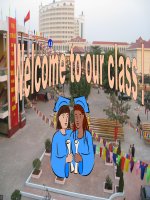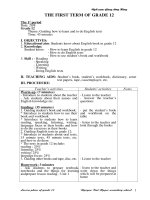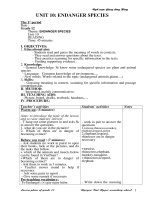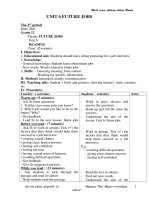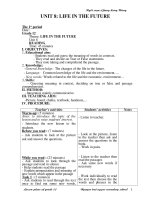Unit 10-K10 (chuẩn)
Bạn đang xem bản rút gọn của tài liệu. Xem và tải ngay bản đầy đủ của tài liệu tại đây (204.03 KB, 9 trang )
Unit 10: Conser va ti on
Period 1 : Reading
I. Aims:
By the end of the lesson, Ss will be able to:
- Use vocabulary items related to the issue of conservation
- Guess the meaning of words based on contexts and components of the words.
- Scan for specific information about conservation
- Skim for general ideas about conservation.
II. Materials: Textbook, whiteboard markers, Cassettes…
III. Procedure:
Teacher Students
1. Warmer:
- Brainstorm: Put the suitable words into the empty boxes: What are some global
problems in the world now?
- What need we do to solve these problems? ( planting trees, preventing global
warming, conservation)
- What is conservation? : Conservation is the protection of natural things such
as plants and animals.
- Group
discussio
n
- Group
discussion
2. Before you read:
- Look at the pictures and then answer the questions:
- What cause some animals and plants to become extinct? ( killing wild
animals, destroying forest)
- How they are protected and saved? ( keeping wild animals and plants in
artificial environment)
• Pre- teach new words:
- destroy ( v): pha huy, huy hoai, pha huy - destruction (n)
- play an important part in something
- conserve (v) : protect from harm : giu gin bao ton- conservation
- clean up : lam sach
- worsen: lam cho cai gi tro nen toi te
- pass law : thong qua luat
- eliminate [i'limineit]: loai ra, loai tr , (sinh vât hoc) bai tiêt, tru khụ ̣ ừ ̣ ̣ ̀ ́
- hydroelectric dam (n) : dap thuy dien
- circulation (n) : su luu thong, chu trinh khep kin
- Pair work
- Take note
- Listen
- Repeat
3. While- reading:
Task 1: Match the word in A with a suitable definition in B
1c- 2a- 3d- 4b
- Individual
work
Greenhouse
effects
floods
pollution
Tree cut
down
Acid rain
Global
warming
The
extinction of
plants and
animals
Forest fire
Environmenta
l problems
Task 2: Decide whether the following statements are T or F
1F- 2T- 3. T- 4T- 5F- 6F
- Ss explain why they think so.
Task 3: Choose the most suitable main idea for each paragraph
1A- 2B- 3C
- Ss explain why they think so.
- Pair work
4. Post- reading: Answering the questions.
- The loss of much forest is destroying the earths
- Man and most animals need a constant supply of water to live. Farmers need
water for their crops
- We should stop polluting rivers and seas and stop the disappearance of plants
and animals.
- Pair work
5. Homework : In workbook
-
I V. Self evaluation:
.. . . . .. . . . .. . . . . . . . . . .. . . . .. . . . .. . . . . .. . . . .. . . . .. . . . . . . . . . .. . . . .. . . . .. . . . . .. . . . .. . . . .. . . . . . . . . . .. . . . .. . . . .. . . . . .. . . . .. . . . .. . . . . . . . . . . .
….... . . . . .. . . . .. . . . .. . . . . .. . . . .. . . . .. . . . .. . . . . .. . . . .. . . . .. . . . . .. . . . .. . . . .. . . . .. . . . . .. . . . .. . . . .. . . . . . . . . . . . . . . . . . . . . . . . . . . . . . . . . . . . .
.. . . . .. . . . .. . . . . . . . . . .. . . . .. . . . .. . . . . .. . . . .. . . . .. . . . . . . . . . .. . . . .. . . . .. . . . . .. . . . .. . . . .. . . . . . . . . . .. . . . .. . . . .. . . . . .. . . . .. . . . .. . . . . . . . . . . .
…………………………………………………………………………………………………………
…………………………………………………………………………………………………………
…………………………………………………………………………………………………………
…………………………………………………………………………………………………………
Unit 10: Conser va ti on
Period 2 : Speaking
IV. Aims:
By the end of the lesson, Ss will be able to:
- Ask for someone’s opinions, and show their agreement or disagreement about the new kind of zoo.
- Talk about the advantages and disadvantages of the new kind of zoo
- Report on discussion results
V. Materials: Textbook, whiteboard markers, Cassettes…
VI. Procedure:
Teacher Stude
nts
1. Warmer:
a. Fill in the table below
Farm animals Wild and zoo animals Pets
Horse, sheep, pig, hen,
fish, cock
Elephant, monkey, tiger,
giraffe, snake, tortoise,
lion, panda, rhinoceros
Cat, parrot, fish, dog,
The group with more words will be the winner
b. Questions:
- Have you ever been to the zoo?
- What animals can you see in the zoo and in the wild?
- What are zoos opened for?
- What animals are in danger?
c. Pictures :
- What are the differences in the two pictures?
- We are going to study a new kind of zoo?
Group
work
2. Pre- speaking:
• Pre- teach new words:
- sensitive: nhay cam
- imprison: cam tu , gaim cam
- reconstruct: xay dung lai
- breed(v): nhan going, gay giong
- reintroduce : dua tro ve moi troung song tu nhien
Task 1: Answer the questions:
They are open to help endangered species develop
The animals are not kept in cages. They can live in their natural environment.
• Showing agreement, or disagreement about the new kinds of zoo.
- Asking for opinions:
what do you think of
Do you think…?
Do you agree with…?
- Giving opinions.
I think….
In my opinion
I don’t think
- Showing agreement
I agree with you…
Yes, I think you are right
I think so
Exactly
- Showing disagreement.
I don’t think so
Yes,….. but…
I don’t agree with you
3. While- speaking
Task 2: Ps discuss and show their ideas
- Call some pairs to practice and show their ideas
- Give the reason why they think so
Task 3: Advantages and disadvantages of zoos of new kind
Advantages Disadvantages
- The conditions the animals are in
( good and safe and natural)
- The animals that people can visit
( people can learn more about these
kinds of animals)
The money spent on reconstructions of the
animals natural environment ( too
expensive)
The dangers that the keepers may have
( many keepers may be in danger)
- G
roup
discussi
on
-
4. Post- Listening: Reporting the results
5. Homework: Write a paragraph about the advantages or disadvantages of keeping
animals in zoo
I V. Self evaluation:
.. . . . .. . . . .. . . . . . . . . . .. . . . .. . . . .. . . . . .. . . . .. . . . .. . . . . . . . . . .. . . . .. . . . .. . . . . .. . . . .. . . . .. . . . . . . . . . .. . . . .. . . . .. . . . . .. . . . .. . . . .. . . . . . . . . . . .
….... . . . . .. . . . .. . . . .. . . . . .. . . . .. . . . .. . . . .. . . . . .. . . . .. . . . .. . . . . .. . . . .. . . . .. . . . .. . . . . .. . . . .. . . . .. . . . . . . . . . . . . . . . . . . . . . . . . . . . . . . . . . . . .
.. . . . .. . . . .. . . . . . . . . . .. . . . .. . . . .. . . . . .. . . . .. . . . .. . . . . . . . . . .. . . . .. . . . .. . . . . .. . . . .. . . . .. . . . . . . . . . .. . . . .. . . . .. . . . . .. . . . .. . . . .. . . . . . . . . . . .
…………………………………………………………………………………………………………
…………………………………………………………………………………………………………
…………………………………………………………………………………………………………
…………………………………………………………………………………………………………
Unit 10: Conser va ti on
Period 3 : List eni n g
VII. Aims:
By the end of the lesson, Ss will be able to:
- listen to get specific information about forest fires
- talk about the causes of forest fires and ways to prevent them
VIII. Materials: Textbook, whiteboard markers, Cassettes…
IX. Procedure:
Teacher Students
1. Warmer:
2. pre- listening
a. Discussion:
- Ask Ps to work in groups to discuss what may cause a fire forest
+ campfire
+ butts of burning cigarettes
+ lightning
+ weather ( too hot and too dry)
+ set fire to the crops
b. Pre- teach new words:
- forester: nguoi trong coi rung, nguoi lam lam nghiep
- awful: khung khiep
- put out : dap lua
- a heap of : mot dong , mot lo
- Group
discussio
n
-
3. While- Listening:
Task 1: Numbering events
3- 2- 5- 1- 4
Task 2: True/ False statements:
- Guessing
- Compare the answers
- Listen and check the answer
1F ( It spreads quickly)
2F ( In late summer)
3T
4T
5F( It is the duty of everyone of us)
Task 3: Listen again and tick the sentence you heard
1a, 2b, 3a
- Individual
work
- Compare
the
answer
4. Post- Listening : Discussion
- The consequences of forest fire?
May trees and animals will be destroyed
Affect the environments
- What should we do to prevent forest fire?
Don t build campfire in the forest’
Listen to the weather forecast to have right actions
Raise awareness about this problem
- Group
discussion
5. Home work: Writing about the actions that may cause forest fire


